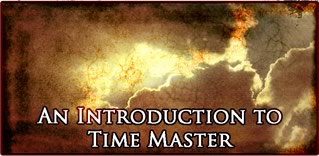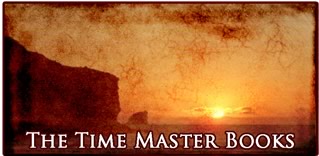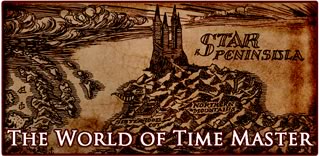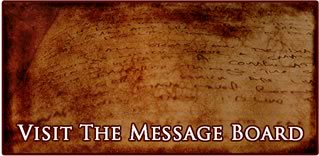Time Master>Introduction>The
Books>The World
The World of Time Master.
A Guide>History>How the World Works>Random Matters
A Brief History....
The world was ruled then by a not entirely human caste of sorcerers known
as magi, who inhabited a bleak castle at the continent's northernmost tip.
According to legend the castle was created by the lords of Chaos, and it and
the magi were held in awe and fear by the ordinary people. In their turn the
magi looked on their subjects much as a farmer looks on his herd animals:
lesser creatures whose sole function was to be made use of in whatever way
their whims might dictate. In a coldly pragmatic way the system worked, provided
the lesser creatures paid their tithes, knew their place and obeyed
their masters without question. Those who did not were swiftly and efficiently
obliterated, and the magi's methods of dealing with any hint of rebellion
served as a terrifying—and effective—object lesson to the rest.
In time, though, the magi's arrogant isolation began to work against them. Inbreeding
had weakened them; fewer and fewer children were being born, and those that did
come along were often sickly and short-lived. They needed new blood. The magi
had always communed with their gods as a matter of course, but the lords of Chaos
were uninterested in these, to them, petty matters. If mortals could not solve
their own problems, they must suffer the consequences. So the magi took the only
course open to them, and for the first time in history, outsiders—willing
or otherwise—were brought to the castle to improve and strengthen the strain.
The culls
were random, and those who were chosen had a stark choice: obey, or die. The
populace already feared the magi; now, the knowledge that they might at any time
be snatched away to face the unknown terrors of the castle added fuel to the
fear. And from there, the seeds of a new rebellion were sown.
The lords of Order, Chaos's old enemy, had been banished from the world centuries
ago. But a secret cult began to grow and strengthen, led by an inner coterie
who had learned the arts of sorcery; arts whose practice was forbidden to any
but the magi. Their aim was to make contact with the lords of Order, and shatter
the barrier that had kept them in exile for so long. If they succeeded, Order
would return to challenge Chaos's rule. It was an extremely dangerous gamble,
but the cult was desperate enough to try.
They succeeded.
Order had returned, and the gods of the old religion became the demons
of the new as Chaos and its followers fell from power. A new age began,
and a triumvirate of rulers was formed to bring reason, stability and justice
to the world. First of these was the hereditary High Margrave, whose function
was to make and administer the laws of the land. Next came the Sisterhood,
a body of women headed by an elected Matriarch, who took care of everyday
religious matters, medicine and the teaching of children. And thirdly,
at the magi's black castle, the sorcerers whose efforts had led to Chaos's
overthrow dedicated themselves to the religious and magical tenets of the
new gods of Order. Occultists, philosophers, teachers, arbiters, these
men and women, known simply as the Circle, became the most powerful and
respected force in the triumvirate, and their leader, or High Initiate,
the most influential figurehead of all.
Order came
to the world in more than name. Sizeable towns grew out of scattered settlements,
drove roads were made where before there had been only random tracks, and new,
fairer systems covering everything from coinage to tithes were established.
This peaceful situation continued over many centuries. The gods of Order were
devotedly worshipped; the days of Chaos were forgotten, and its denizens reduced
to folklore tales with which to frighten children into obedience. The only
real legacy of the old days was in the form of the Warps—terrifying supernatural
storms that could strike anywhere without warning, and which were reputed to
destroy anyone unlucky enough to be caught in the open.
But there are inherent dangers when any system reigns unopposed for too
long, and in time the rule of Order grew less benevolent. Temperance began
to lead to rigid conformity, justice took on elements of bigotry, mercy
was tainted with the concept—and practice—of retribution; until
only the orthodox way, laid down and enshrined in law, was tolerated. So,
inevitably, the pendulum began to swing back—and the lords of Chaos
were waiting to exploit it.
The clash between the opposing forces was less cataclysmic than the battle
that had led to the overthrow of Chaos centuries before, but the result
was as far-reaching. Chaos returned to the world—but Yandros, greatest
of the Chaos lords, is always unpredictable, and instead of banishing Order
he decided that the world would be a great deal more interesting if mortals
were permitted to choose their own allegiances and act accordingly. So
the Age of Equilibrium began, in which Chaos and Order were officially
paid equal homage but preferences were left entirely to the individual.
This was not to the liking of Aeoris of Order and his brothers, but the
choice was Yandros's to make and there was nothing they could do.
Equilibrium has now held for more than two hundred years. The gods are
bound not to interfere in human affairs unless directly asked to do so,
and the sorcerers of the Circle are responsible for ensuring that this
status quo is maintained. Given the nature of the relationship between
Yandros and Aeoris, and the mayhem that has ensued in the past when the
gods have clashed, theirs is not an enviable task. And there are time when
the temptation to bend the rules a little and exert a little direct influence
on the mortal world is irresistible, especially to Yandros.
But, on the
whole, the balance is holding.
Though the future is unknown territory, even to the gods…




